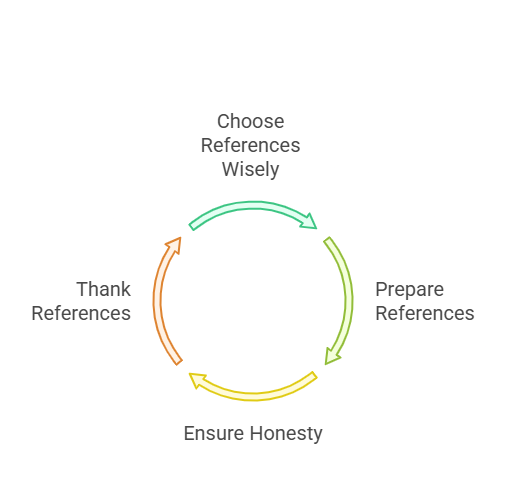Reference Check Questions to Ask: A Complete Guide for Employers and Job Seekers
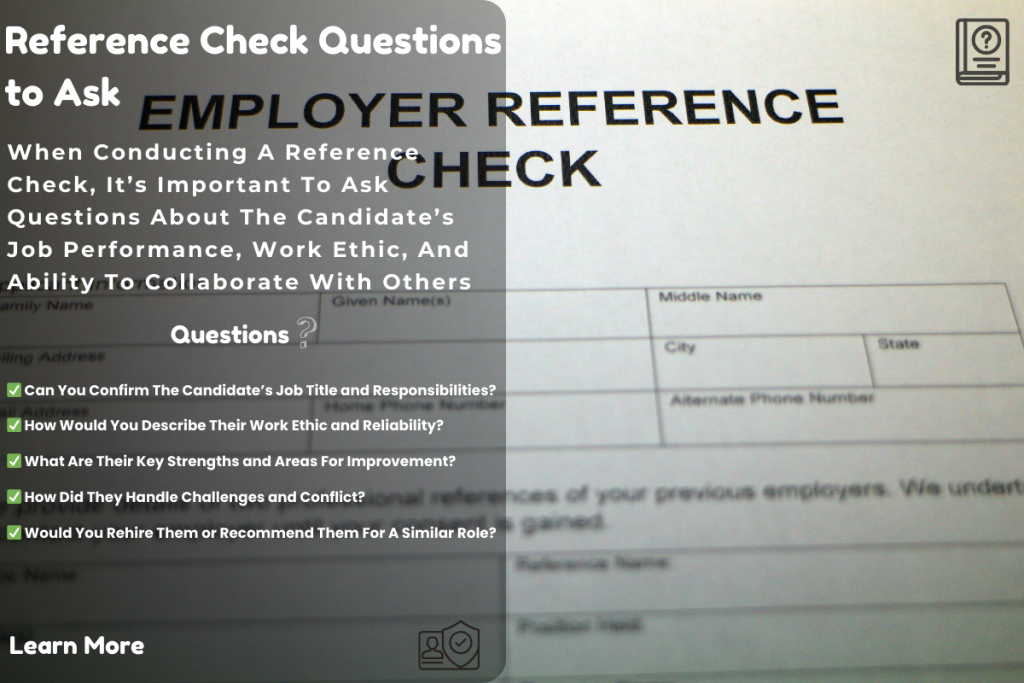
What is a Reference Check and Why Are Questions Important in the Hiring Process?
A reference check is an essential step in the hiring process that allows employers to verify the information provided by a job candidate and gain deeper insights into their qualifications, work habits, and behavior in a professional setting. By reaching out to individuals who have worked closely with the candidate, typically former employers, supervisors, or colleagues, employers can assess whether the candidate will be a good fit for the role and organization.
Why are Reference Checks Important?
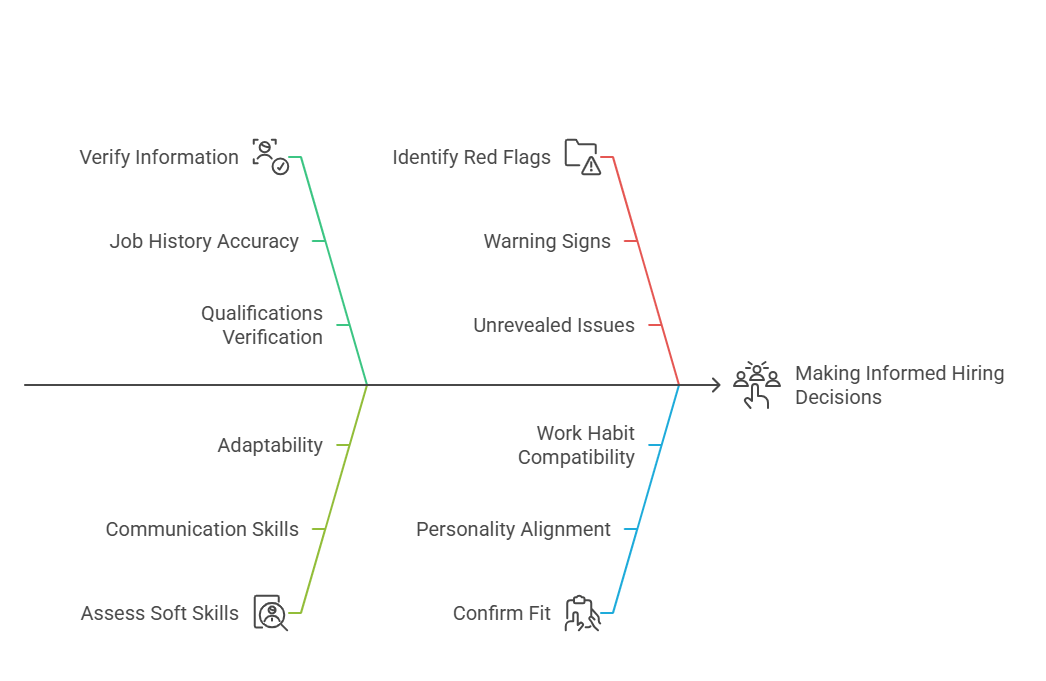
Reference checks provide critical, external validation of the claims made by job candidates during the application and interview process. While a resume or application form gives a snapshot of a candidate’s experience and skills, it doesn’t always reveal how they apply those skills in real-world situations. Reference checks help confirm a candidate’s abilities and ensure they align with the company’s needs.
Reference check questions allow employers to assess qualities that are often difficult to evaluate during interviews, such as a candidate’s work ethic, attitude toward teamwork, and cultural fit. They help employers make more informed, unbiased decisions, reducing the risk of making a bad hire.
Here are a few reasons why reference checks and well-crafted questions are vital:
- Verify Information: Ensure that the details provided by the candidate are accurate, including their job history, qualifications, and responsibilities.
- Assess Soft Skills: Evaluate important intangible qualities, such as interpersonal skills, adaptability, and communication.
- Identify Red Flags: Uncover potential warning signs or areas of concern that may not have been revealed during the interview process.
- Confirm Fit: Ensure that the candidate’s personality and work habits align with the company culture and the role they’re applying for.
Role of Reference Check Questions
The role of reference check questions is to gather specific, relevant information that provides a clearer picture of the candidate’s performance in previous roles. Unlike interview questions, which are often designed to gauge how a candidate might perform in the future, reference check questions focus on past behavior and performance. Research shows that past behavior is often the best predictor of future performance, making reference checks an invaluable tool.
The types of questions asked during a reference check vary, but they should always aim to uncover details related to the candidate’s job performance, reliability, strengths, weaknesses, and interpersonal dynamics. These questions can also shed light on how the candidate deals with challenges, works with others, and fits within a team structure.
In the following section, we’ll dive deeper into the specific reference check questions to ask, explaining their purpose and how the answers can help employers evaluate potential hires more effectively.
Top Reference Check Questions to Ask and What They Reveal About Candidates
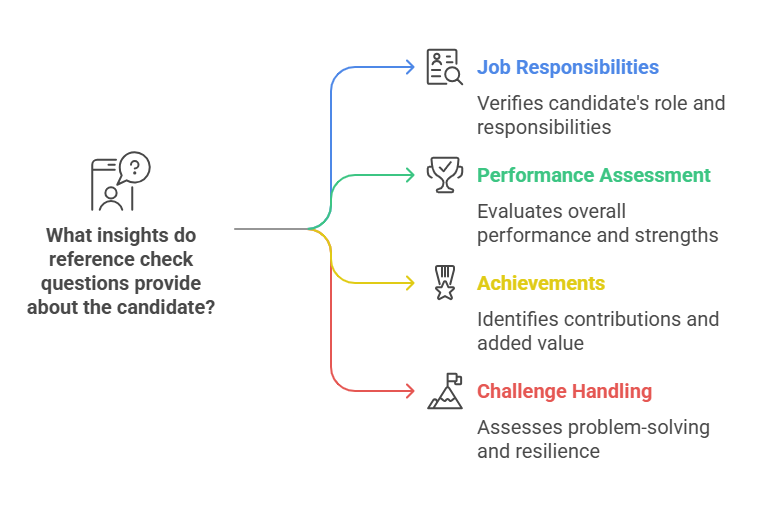
Reference checks are crucial for gaining an unbiased perspective on a candidate’s job performance, behavior, and qualifications. When conducting reference checks, it’s essential to ask the right questions to ensure you’re gathering valuable insights that will inform your hiring decision. Below is a list of essential reference check questions, categorized to assess various aspects of a candidate’s performance and character, along with an explanation of what each question reveals about the candidate.
Job Performance and Skills
- Can you describe the candidate’s job responsibilities and duties in their previous role?
- What It Reveals: This question helps verify the candidate’s job title and responsibilities as stated on their resume. It also provides insight into the candidate’s actual role in the company and whether they were involved in tasks related to the job they are applying for.
- How well did the candidate perform in their role?
- What It Reveals: This question provides an overall assessment of the candidate’s performance. It gives the reference a chance to highlight the candidate’s strengths and areas where they excelled, which is important for understanding their suitability for the new role.
- What specific achievements or contributions did the candidate make during their time with your company?
- What It Reveals: This question digs deeper into the candidate’s accomplishments and contributions. It can help identify whether the candidate goes above and beyond the basic requirements of their role and whether they can bring added value to your organization.
- How did the candidate handle challenges or difficult situations at work?
- What It Reveals: This question sheds light on the candidate’s problem-solving skills, resilience, and ability to adapt under pressure. How they respond to challenges is often a key indicator of their performance in high-pressure situations.
Work Habits and Dependability
- Was the candidate punctual and reliable?
- What It Reveals: Reliability and punctuality are critical qualities for any employee. This question helps assess the candidate’s dependability, which is a strong indicator of their overall work ethic.
- How would you describe the candidate’s organizational and time-management skills?
- What It Reveals: This question provides insight into the candidate’s ability to manage their workload effectively and stay organized. It’s especially important for roles that require multitasking or the ability to meet deadlines.
- Did the candidate demonstrate a strong work ethic and willingness to take initiative?
- What It Reveals: Employers value candidates who demonstrate self-motivation and take ownership of their tasks. This question can help you assess whether the candidate proactively contributes to the success of the team and organization.
Interpersonal Skills and Teamwork
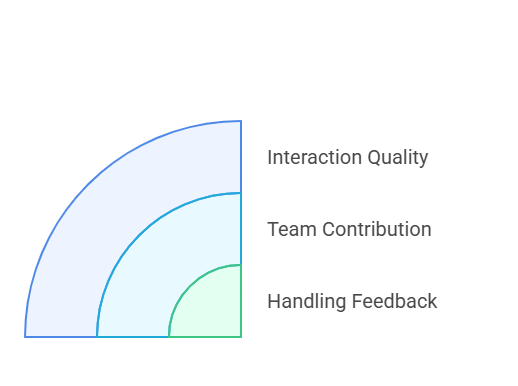
- How did the candidate interact with colleagues, subordinates, and supervisors?
- What It Reveals: Interpersonal skills are crucial for most roles, especially those that require teamwork. This question helps assess how well the candidate collaborates with others, their ability to handle conflicts, and their communication style.
- Was the candidate a team player, and how did they contribute to group efforts?
- What It Reveals: This question reveals how well the candidate works with others in a team environment. It gives insight into whether they support their colleagues, share ideas, and contribute to the success of the team as a whole.
- How did the candidate handle feedback and criticism?
- What It Reveals: This question assesses the candidate’s ability to accept constructive criticism and use it to improve. Candidates who can respond to feedback positively are more likely to grow and develop in their roles.
Reliability and Cultural Fit
- Would you rehire this candidate if given the opportunity?
- What It Reveals: This is often considered one of the most telling questions, as it directly speaks to the candidate’s overall performance and how they were perceived within the company. If the answer is positive, it indicates that the reference believes in the candidate’s abilities and character.
- What kind of work environment does the candidate thrive in?
- What It Reveals: This question helps determine whether the candidate will be a good cultural fit for your organization. Understanding the type of environment where a candidate excels can help you assess whether they’ll be comfortable and productive in your workplace culture.
- What would you say are the candidate’s biggest strengths and areas for improvement?
- What It Reveals: This question provides a balanced perspective on the candidate’s abilities. The strengths give you insight into what they bring to the table, while the areas for improvement highlight any potential concerns or development opportunities.
Streamline Your Reference Checks with Precisehire
These questions help verify a candidate’s skills, work ethic, and overall suitability for the role. For businesses looking to streamline the reference checking process, Precisehire provides comprehensive background check services, including reference checks, criminal history reports, and employment verifications. With our user-friendly platform, employers can quickly gather reliable information to make informed hiring decisions. Visit Precisehire to learn more about our services and how we can assist you in your hiring process.
Final Thoughts on Reference Check Questions
When conducting reference checks, it’s important to ask open-ended questions that allow the reference to provide detailed answers. These questions should be tailored to the specific job and the candidate’s experience. Asking the right reference check questions enables employers to gather comprehensive information that helps them assess whether a candidate will succeed in their role and fit within the company culture.
In the next section, we will answer frequently asked questions about reference checks, providing additional insights for both employers and job seekers.

